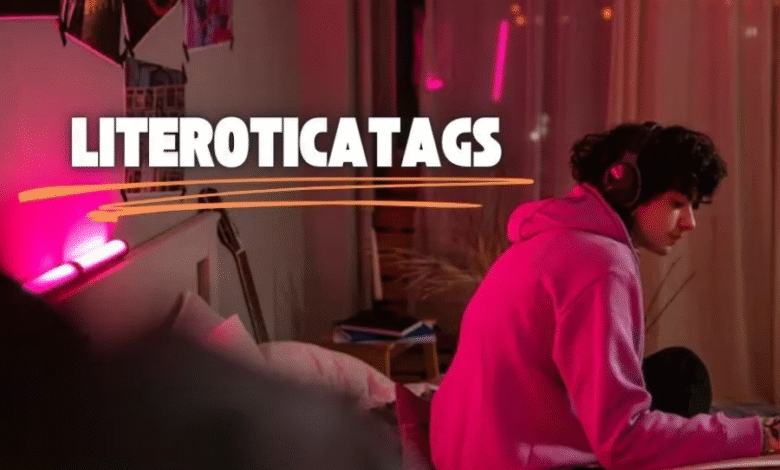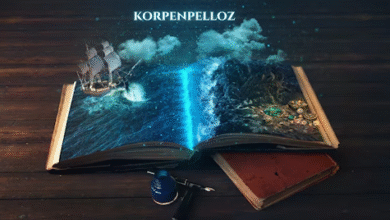Navigating Erotic Storytelling with Literoticatags

Introduction
What makes a story resonate deeply with its reader? How do we find narratives that speak to our unique desires in a sea of digital content? In the realm of online erotica, Literotica has carved out a distinctive space since its inception in 1998, offering a platform for user-submitted erotic fiction. At the heart of this vibrant ecosystem lies its tagging system, affectionately dubbed “Literoticatags” by its community. These tags are more than mere labels; they are gateways to discovery, connection, and creative expression. But how do these tags function, and why do they matter so much in shaping the experience of erotic storytelling? Let’s explore the multifaceted world of Literoticatags, their evolution, and their profound impact on digital erotica.
What is Literoticatags?
Imagine you’re browsing a vast library where every book promises an intimate adventure. How do you choose? Literoticatags are metadata keywords assigned to stories on Literotica, designed to categorize and describe their content. Think of them as digital signposts, guiding readers through a labyrinth of narratives. Tags might indicate broad genres like Romance or Sci-Fi, specific dynamics like Enemies-to-Lovers, or niche interests such as BDSM or Slow Burn. For instance, a story might carry tags like #OfficeRomance, #ForbiddenLove, or #FirstPerson, offering immediate insight into its themes and style.
Why are these tags so crucial? How do they compare to hashtags on social media or categories in a bookstore? For readers, tags streamline the search for stories that align with their preferences. For writers, they’re a strategic tool to attract the right audience. Over time, Literoticatags have evolved into a dynamic language, reflecting both the diversity of erotic fiction and shifting cultural attitudes toward sexuality. What might this suggest about the role of categorization in shaping our digital experiences?
The Purpose of Tags in Erotic Storytelling
With millions of stories on Literotica, navigating without tags would be like wandering a city without a map. How do readers find narratives that resonate with their specific tastes? Tags act as filters, allowing users to hone in on content that matches their interests—be it Historical Erotica, LGBTQ+ narratives, or Quickie tales. This precision is vital in a genre where personal preference is paramount. But what deeper purpose do tags serve beyond mere organization?
Empowering Writers
For authors, tags are a creative and strategic asset. By carefully selecting tags, writers can amplify their story’s visibility and connect with readers who share their interests. A well-tagged story is more likely to appear in relevant searches, gain traction, and spark engagement. Consider a writer specializing in Fantasy Erotica: by using tags like #DragonRomance or #MagicalBond, they carve out a niche and build a dedicated readership. How might the choice of tags influence a writer’s creative process or their connection with their audience?
Fostering Community
Tags do more than organize content; they cultivate communities. Readers who gravitate toward tags like #Polyamory or #AgeGap often connect through comments, forums, or shared recommendations, forming micro-communities within Literotica’s broader ecosystem. This sense of belonging encourages interaction, inspires new stories, and enriches the platform’s diversity. How do these micro-communities reflect the broader dynamics of online spaces? What role does shared interest play in building digital connections?
The Anatomy of Popular Literoticatags
The world of Literoticatags is vast and varied, but certain categories consistently rise to prominence. Why do some tags capture widespread attention? Popular tags often mirror cultural trends and reader preferences, offering a window into the evolving landscape of erotic storytelling. Common categories include:
- Genre-Based Tags: Romance, Horror, Sci-Fi, Fantasy
- Relationship Dynamics: Friends-to-Lovers, Boss/Employee, Forbidden Love
- Kinks and Fetishes: BDSM, Voyeurism, Roleplay
- Identity and Representation: LGBTQ+, Interracial, Non-Binary
- Narrative Style: First Person, Epistolary, Flash Fiction
Tags like #ConsentIsKey or #BodyPositivity highlight a growing emphasis on ethical and inclusive storytelling. What do these trends reveal about societal attitudes toward sexuality and representation? How might the popularity of certain tags shape the stories writers choose to tell?
Challenges in Tagging Erotic Content
While tags are indispensable, they’re not without complications. What happens when a system relies on human judgment and subjective interpretation? Let’s consider some of the challenges inherent in tagging erotic content.
Subjectivity and Mislabeling
Tagging is an art, not a science. A story labeled #DubiousConsent by one author might be perceived as #NonConsent by readers, leading to mismatched expectations. Vague tags like #Sexy or #Hot offer little clarity, while misapplied tags—such as #Romance on a purely sexual story—can frustrate users. How does subjectivity in tagging affect the reader’s experience? What strategies could mitigate these issues?
Over-Tagging and Spam
In their quest for visibility, some writers overload stories with irrelevant tags. A Vampire Erotica tale tagged with #Cooking or #Travel undermines the system’s integrity and dilutes the user experience. How does this practice impact trust in the platform? What balance should writers strike between visibility and accuracy?
Moderation and Sensitivity
Tags touching on taboo topics, such as #Incest or #PowerDynamics, raise ethical questions. Literotica enforces strict guidelines against illegal content, but moderators must navigate a delicate balance between creative freedom and responsibility. Poorly managed tags risk normalizing harmful stereotypes or attracting predatory behavior. How should platforms approach the moderation of sensitive tags? What role does community feedback play in maintaining ethical standards?
The Evolution of Literoticatags
How has the tagging system evolved alongside Literotica’s growth? Let’s trace its journey from the platform’s early days to its potential future.
Early Days (1998–2010)
When Literotica launched, its tagging system was basic, relying on broad categories like Heterosexual, Lesbian, or Group Sex. As the user base expanded, so did the need for more nuanced categorization. What limitations might a rudimentary tagging system impose on a growing platform?
User-Driven Expansion (2010–Present)
The introduction of user-generated tags marked a turning point, democratizing the system and allowing for greater specificity. However, this freedom brought challenges, such as inconsistent or overly niche tags. Moderation and community guidelines became essential to maintain coherence. How does user-driven tagging reflect the collaborative nature of online communities?
AI and Automation (Future Trends)
Looking ahead, could artificial intelligence revolutionize tagging? AI could analyze story content or user behavior to suggest precise tags, reducing human error. Yet, this raises concerns about privacy, algorithmic bias, and the loss of human nuance. What might a hybrid approach—blending AI and user input—look like? How could it enhance or complicate the Literotica experience?
The Psychological Impact of Tags
Beyond their practical function, tags shape how users perceive and engage with erotic content. How do labels influence our understanding of desire? For many, discovering tags like #Asexual, #KinkPositive, or #QueerErotica validates personal identities and fosters self-acceptance. Research suggests that clear categorization can reduce stigma around consuming erotica by normalizing diverse desires within defined boundaries.
Conversely, poorly moderated tags might reinforce stereotypes or marginalize certain groups. For example, overuse of #Exotic for interracial stories could perpetuate harmful tropes. How do tags influence the psychological experience of reading erotica? What responsibility do platforms bear in shaping these perceptions?
Literoticatags vs. Mainstream Content Tagging
How does Literotica’s tagging system compare to mainstream platforms like Netflix or Spotify? Unlike algorithm-driven recommendations, Literoticatags are transparent and user-controlled, fostering trust but lacking the personalization of machine learning. Could a hybrid model—combining user tags with AI insights—offer the best of both worlds? What lessons might mainstream platforms learn from Literotica’s community-driven approach?
Expanding on Literoticatags: A Deeper Dive
The Role of Tags in Shaping Erotic Narratives
Tags don’t just describe stories; they influence their creation. Writers often tailor narratives to align with popular tags, ensuring visibility. The rise of #EnemiesToLovers, for instance, has inspired countless tales of rivalry-turned-romance. How does this interplay between tags and storytelling reflect the collaborative dynamic of digital platforms? What might this suggest about the relationship between creators and their audience?
The Ethics of Tagging
Tags like #DubiousConsent or #NonConsent walk a fine line between fantasy and reality. While they cater to specific audiences, they risk trivializing serious issues like consent. Platforms must balance creative freedom with social responsibility, ensuring tags don’t perpetuate harmful narratives. How can Literotica maintain ethical standards without stifling artistic expression?
The Global Reach of Literoticatags
Literotica’s English-language focus belies its global user base. Tags like #Interracial or #CulturalExchange reflect diverse perspectives, but cultural nuances complicate their use. A tag like #Harem, for example, carries different connotations in Western versus Eastern contexts. How can Literotica navigate these differences to remain inclusive? What role do tags play in fostering cross-cultural understanding?
The Role of Community in Tagging
Literotica’s tagging system thrives on community participation. Users suggest tags, report inaccuracies, and debate best practices, fostering a sense of ownership. This collaboration ensures the system evolves with the community’s values, but it requires vigilant moderation to prevent misuse. How does community involvement strengthen the platform? What challenges arise from relying on collective input?
The Intersection of Tags and Identity
For many, tags are more than labels—they’re affirmations of identity. Tags like #Transgender, #Bisexual, or #NonBinary amplify marginalized voices, offering visibility in a genre often dominated by heteronormative narratives. How do these tags empower users to see themselves in the stories they read or write? What impact does representation have on the broader erotica community?
Final Thoughts
What does it mean to navigate desire in the digital age? Literoticatags offer a powerful answer, transforming a sprawling library of stories into a personalized journey of discovery. By organizing content, fostering communities, and reflecting cultural shifts, these tags shape the future of erotic storytelling. They remind us that even in the most intimate corners of the internet, clarity, connection, and choice are paramount.
As Literotica continues to evolve, its tagging system will remain a cornerstone of its success, inviting users to explore their desires, connect with others, and create stories that resonate. In a world where digital platforms increasingly influence how we understand intimacy, Literoticatags stand as a testament to the power of categorization—not just to organize, but to empower, validate, and inspire. How might we, as readers and creators, embrace this potential to build a more inclusive, ethical, and vibrant space for storytelling?





